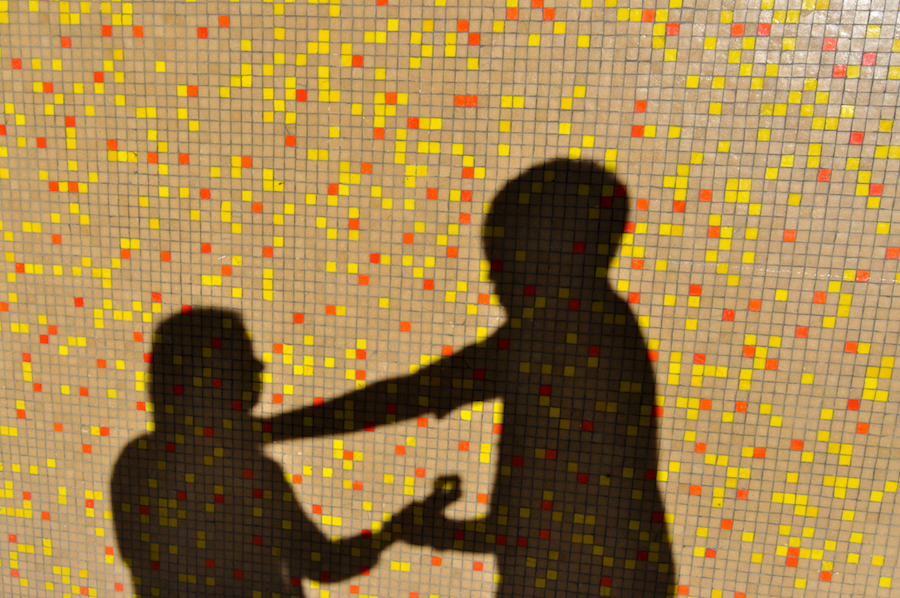
Campus organizations spread the word for healthy relationships during Dating Violence Awareness Month
This February, UC Davis organizations worked to improve awareness of the often lesser-recognized threat to college relationships: dating violence.
The realm of dating violence is less commonly referenced than domestic violence, which focuses on violence between marital partners, and recognizes violent and emotionally abusive behaviors within dating relationships.
A report released by the UC Davis Title IX, Office lists a total of 88 sexual violence reports — including domestic and dating violence — submitted to the office between July 1, 2014 to June 30, 2015. With this clear indicator that UC Davis is no exception when it comes to violent relationships, specific organizations took advantage of Dating Violence Awareness month to do their part in supporting, preventing and educating the campus.
“If we are providing services that encompass all gender-based violence, then we really need to pay attention to that too,” said Sarah Meredith, director of the Center for Advocacy Resources and Education (CARE). “The awareness month really is to bring back to the forefront that there are students on this campus that are experiencing sometimes very egregious forms of abuse that are impacting their ability to get an education, their mental health [and] sometimes their physical health.”
CARE is a campus resource that participated in the month by providing resources to support those on campus who are victims of violent scenarios, including sexual assault, dating violence, domestic violence and stalking.
According to Meredith, dating violence has recently garnered more attention on college campuses. Although dating violence now has a month of recognition, Meredith pointed out that it still receives less attention than it deserves.
“There was not a lot of attention being paid to abuse happening […] within relationships where the people involved are adolescents or young adult,” Meredith said. “Certainly when we talk about the law, […] dating violence became a crime more recently [than domestic violence], and more recognition of the relationship of dating [is happening] because abuse that happens within those dating relationships can be just as egregious as abuse that happens within, let’s say, a marital relationship.”
Aside from the recent legal recognition of the severity of dating violence, Meredith described that the social acceptance of the depth and threat of dating violence is still a work in progress.
“There was this sort of sense that [dating violence] wasn’t as serious [as domestic violence], that it didn’t have the same sort of impact for these people,” Meredith said. “More recognition started coming to dating violence when we started realizing that the prevalence of violence within those relationships was very high. Even on a college campus we see rates of domestic and dating violence that are pretty equal to the rates of sexual violence and sexual assault.”
Meredith encourages UC Davis students and community members to show their support to one another, not only by helping those who are already the victims of violence, but also by working to promote a culture of healthy relationships.
“The first thing I would love to see is more of a promotion of healthy, respectful relationships just in general, but also within dating relationships,” Meredith said. “Also really being aware of those ‘red flags’ or warning signs that might come up that might indicate that [a relationship] is potentially abusive or could be abusive.”
While CARE aimed to create awareness from an advocate and support-based perspective, the 137 members of the Panhellenic sorority Alpha Chi Omega dedicated their time and fundraising to bring student support to the issue. Melissa Cane, third-year environmental science and management major and Alpha Chi Omega’s philanthropy vice president, discussed their recent promotion of “Healthy Relationships Week,” which took place from Feb. 7 to 14.
“What we focused on with Healthy Relationships Week this year was consent and communication between people in a relationship,” Cane said. “To make sure that whatever happens between them that both parties are completely willing […] and that nothing is forced or makes someone uncomfortable — that’s healthy.”
The event covered various aspects of student life to gain attention for the cause and to provide a student perspective into the relevance of dating violence.
“The event was tabling for awareness, and it coincided with Valentine’s Day so we handed out little valentines,” Cane said. “We did raise some money — and we didn’t even ask for money — [so] it was really good to see students still willing to support the philanthropy and healthy relationships.”
Kelsey Pitman, third-year psychology major and the president of Alpha Chi Omega, believes that her sorority’s efforts made a difference this month and will continue to do so year-round through both monetary donation and peer education.
“The money that we did raise [during Healthy Relationships Week] went to Empower Yolo, which is our local women’s shelter in Yolo County,” Pitman said. “We also did a social media campaign during Healthy Relationships Week where we tried to educate our own members […] to take time and realize what healthy relationships they had and share that with followers on their social media platforms.”
Pitman recognized the importance of taking the time to reflect on relationships is, particularly for college students.
“During this time in our lives, it is important to realize what a healthy relationship is,” Pitman said. “I think with the college culture [of dating], our idea often gets distorted on what we deserve and what should be the norm of relationships. It’s really important to spread that awareness of what a healthy relationship is.”
For students, staff and faculty experiencing any form of relationship violence, CARE, the Lesbian, Gay, Bisexual, Transgender, Queer, Intersex and Asexual Resource Center, and the Women’s Resources and Research Center all offer confidential resources that those in distress are encouraged to contact as a first step.
Written by: Lindsay Billings — features@theaggie.org




